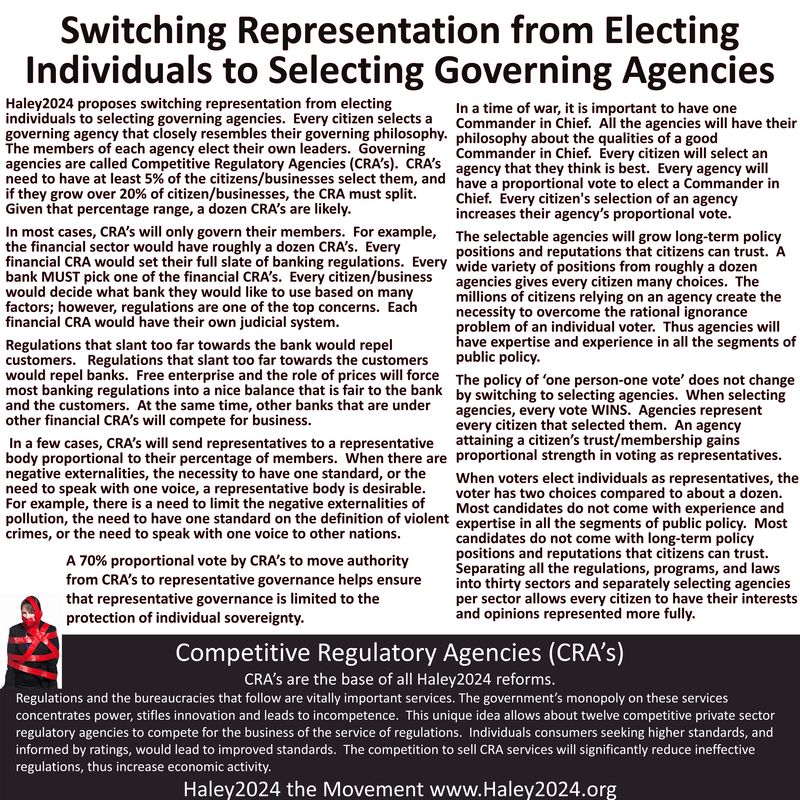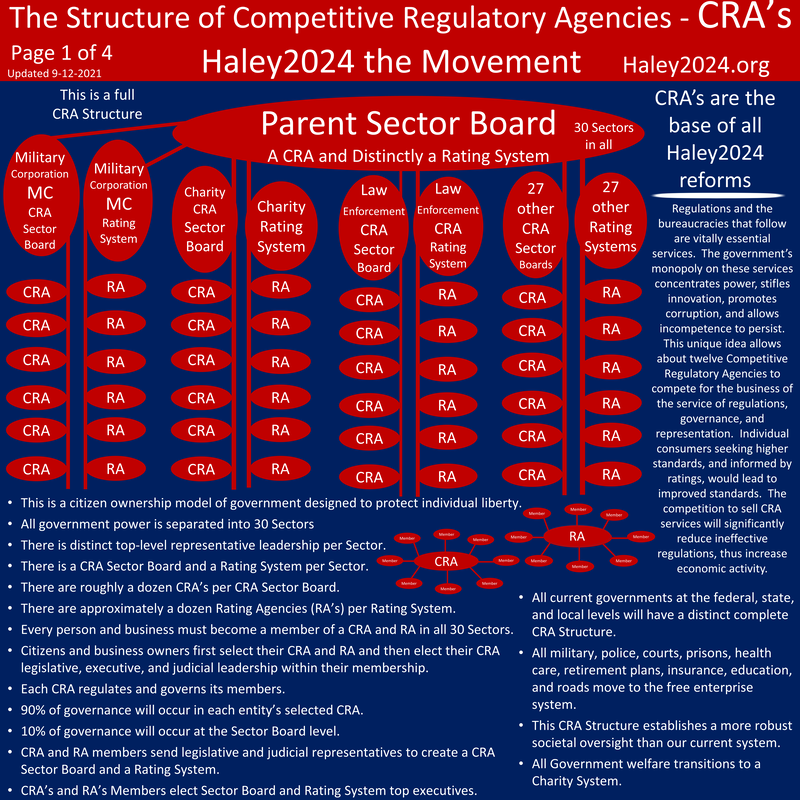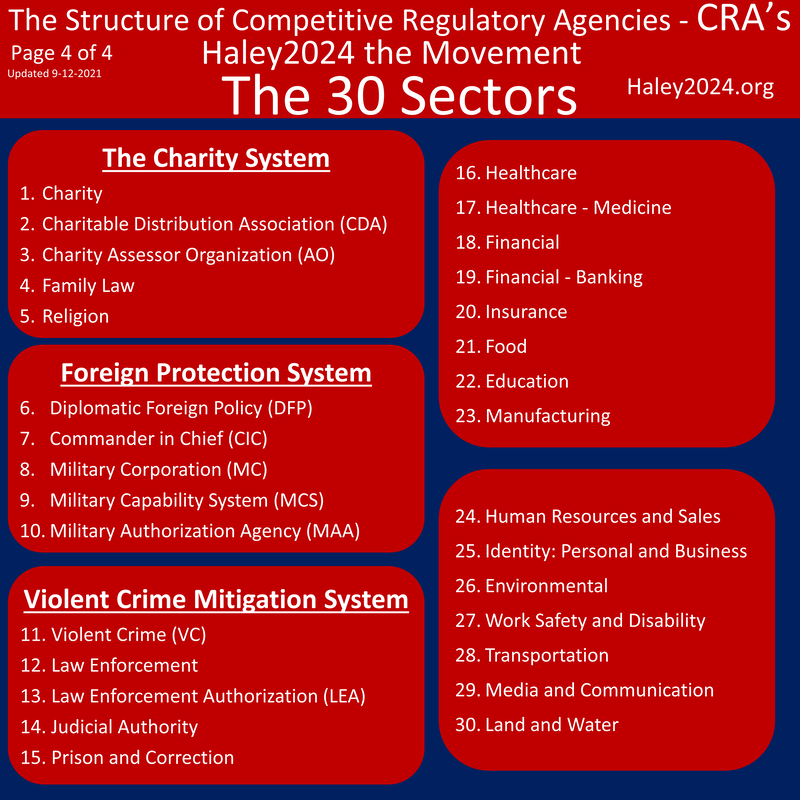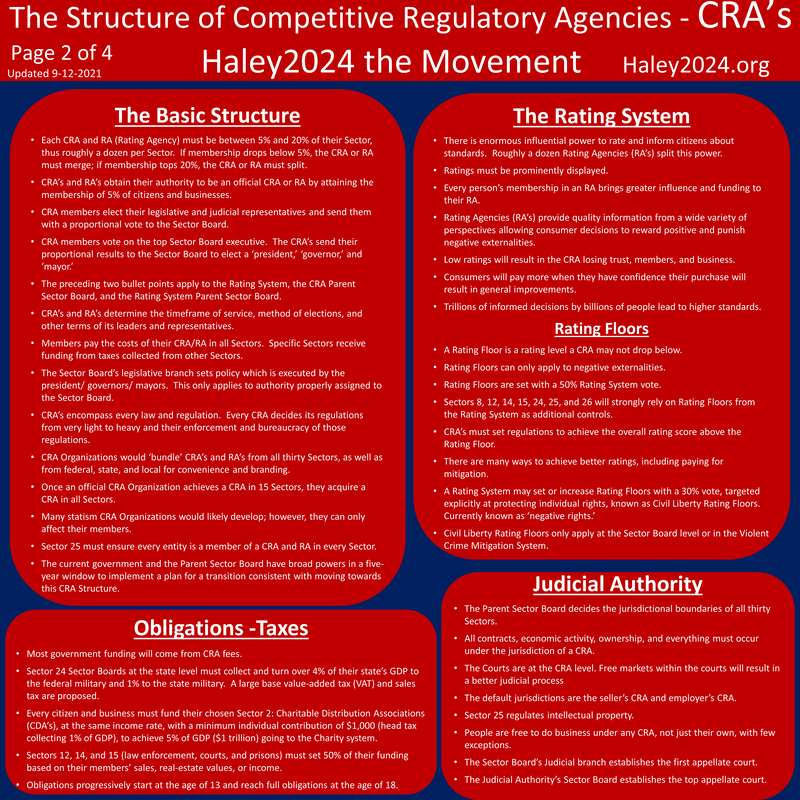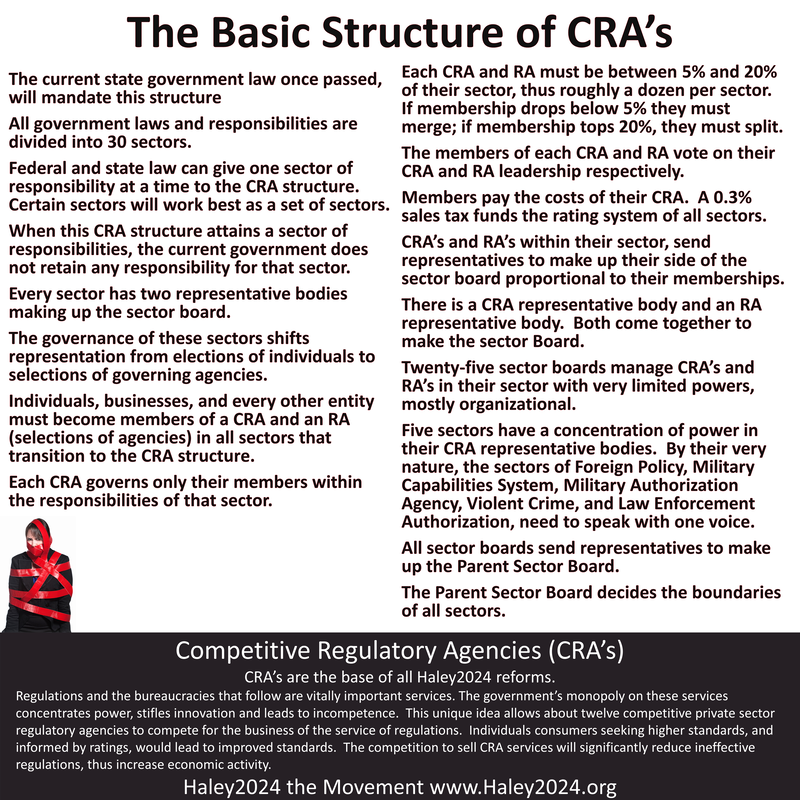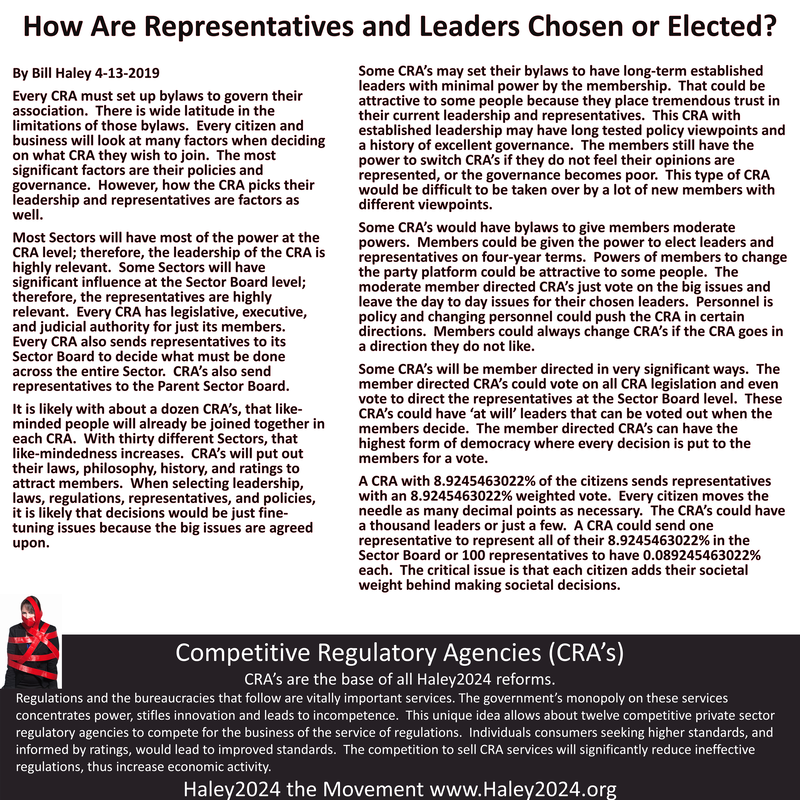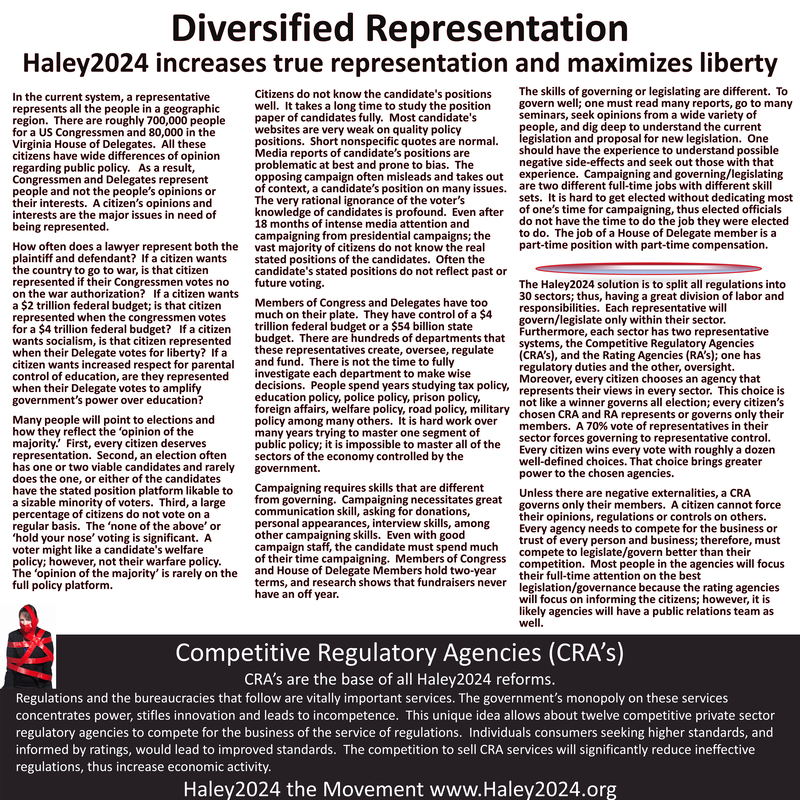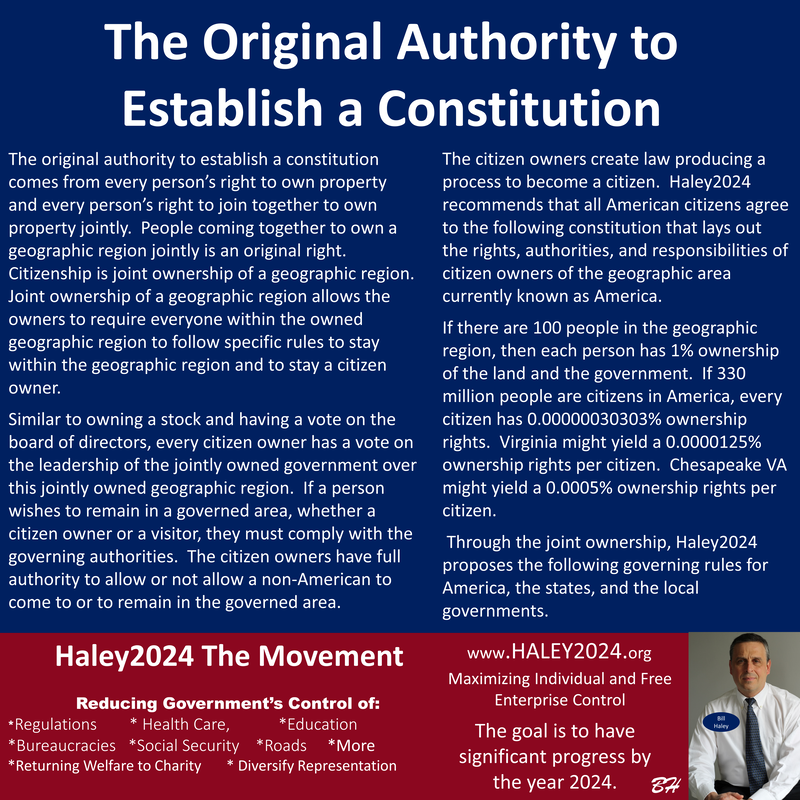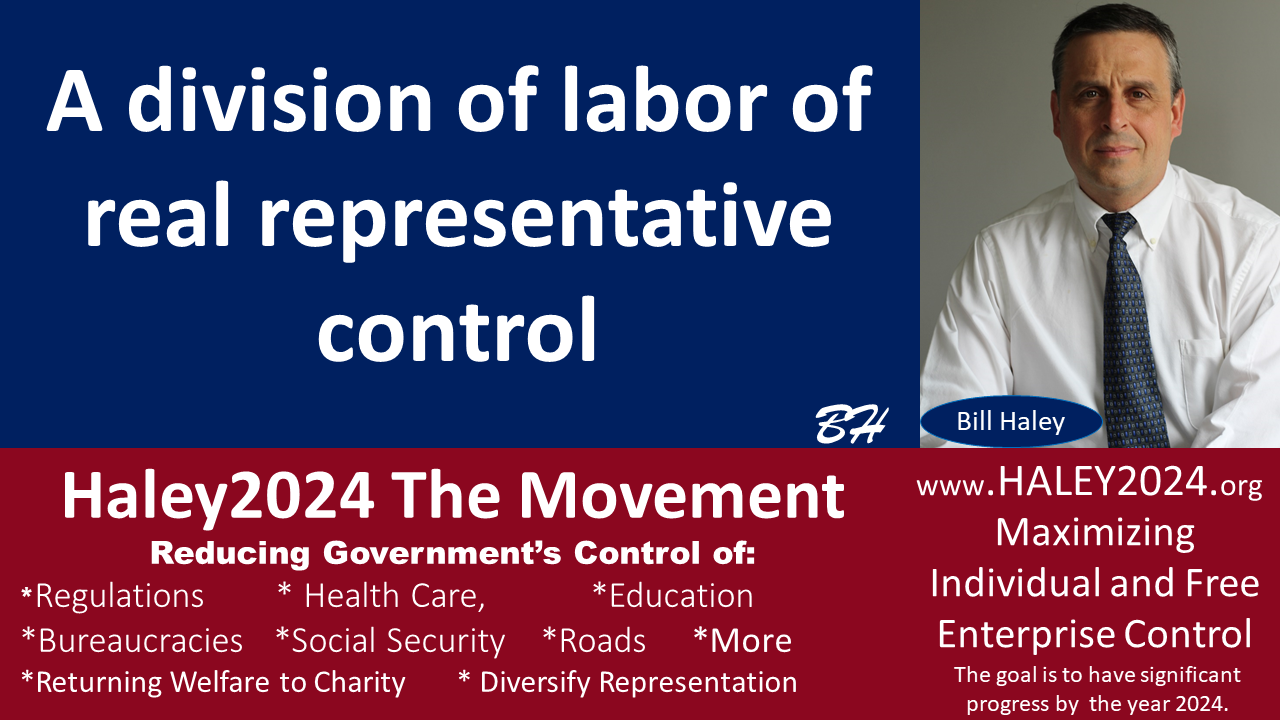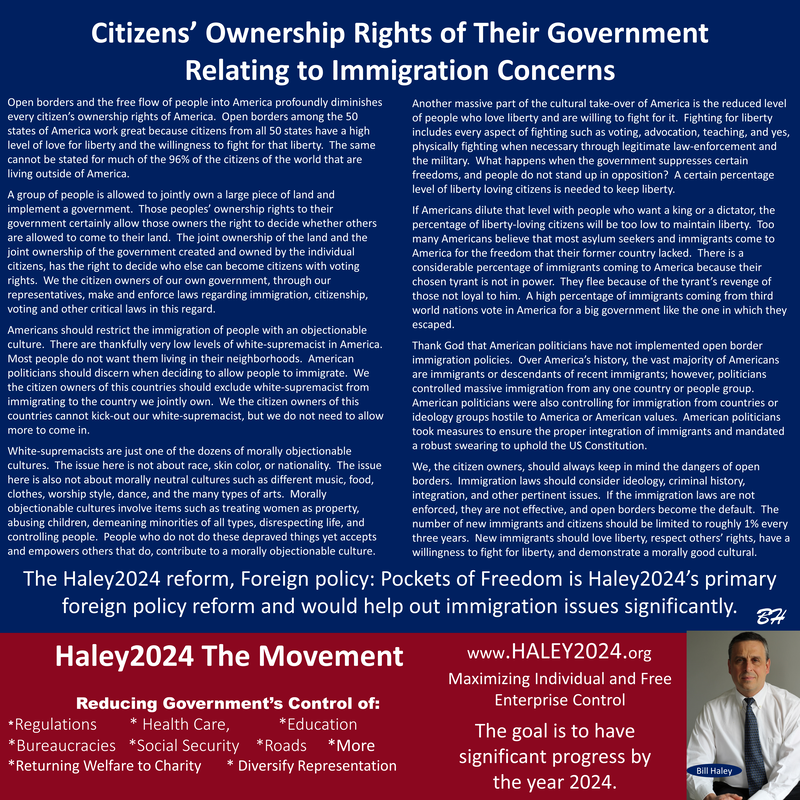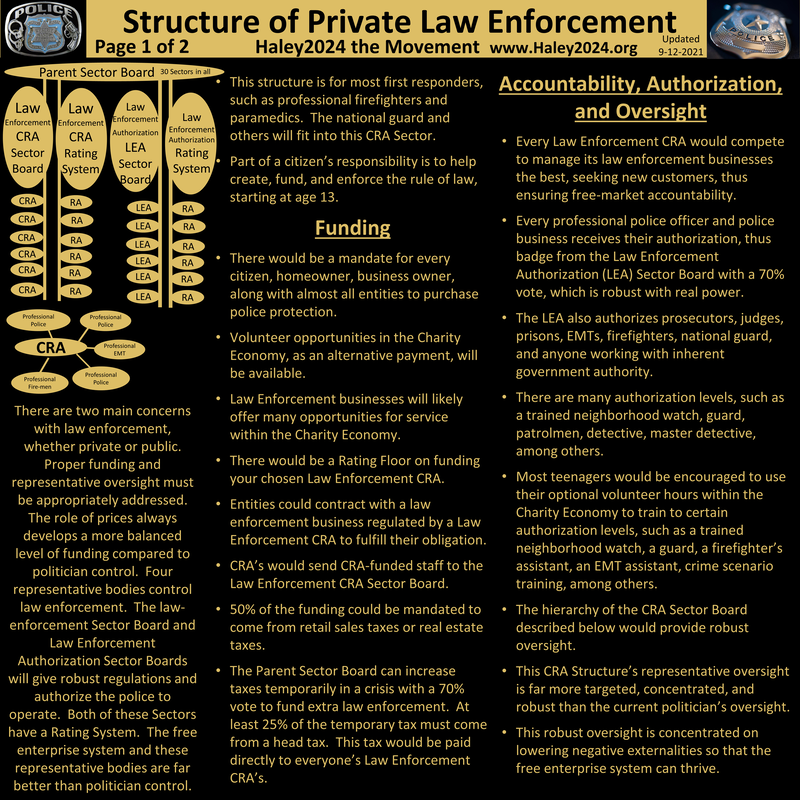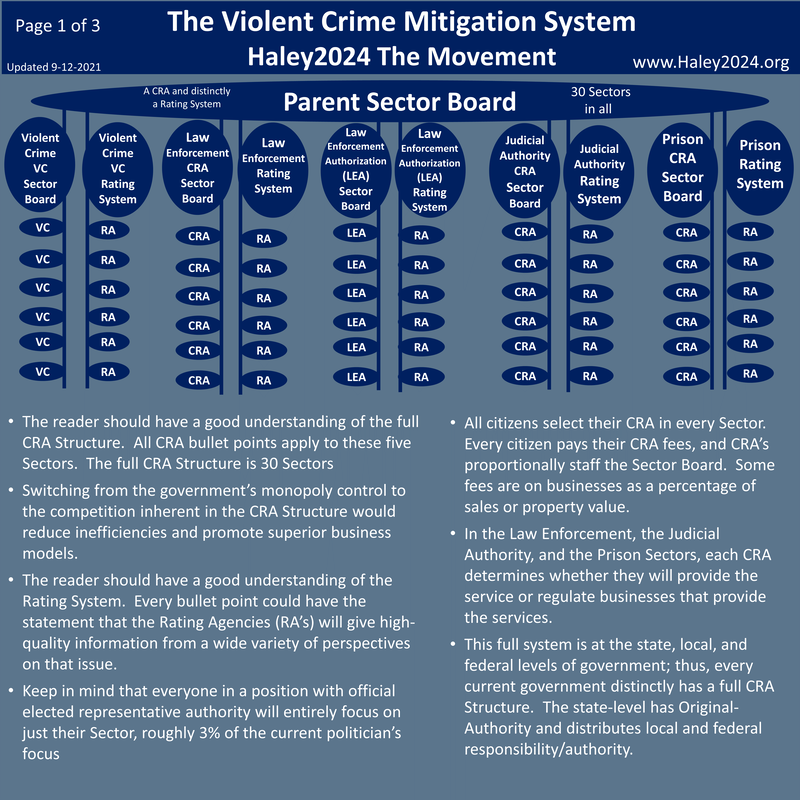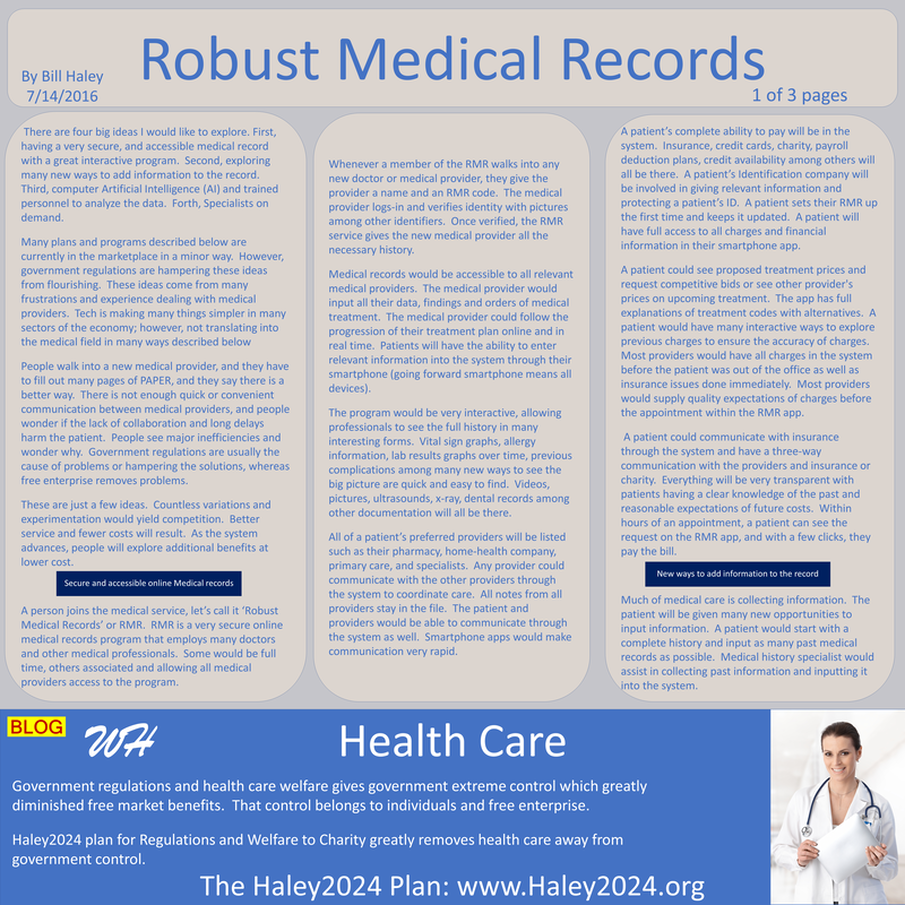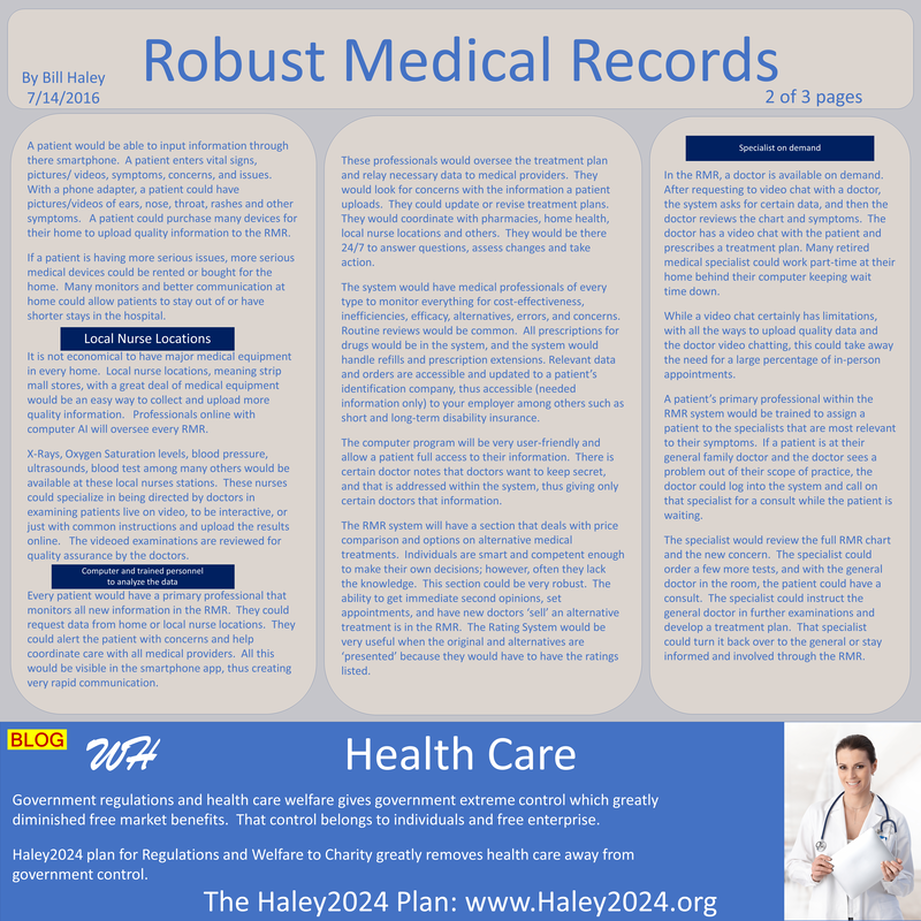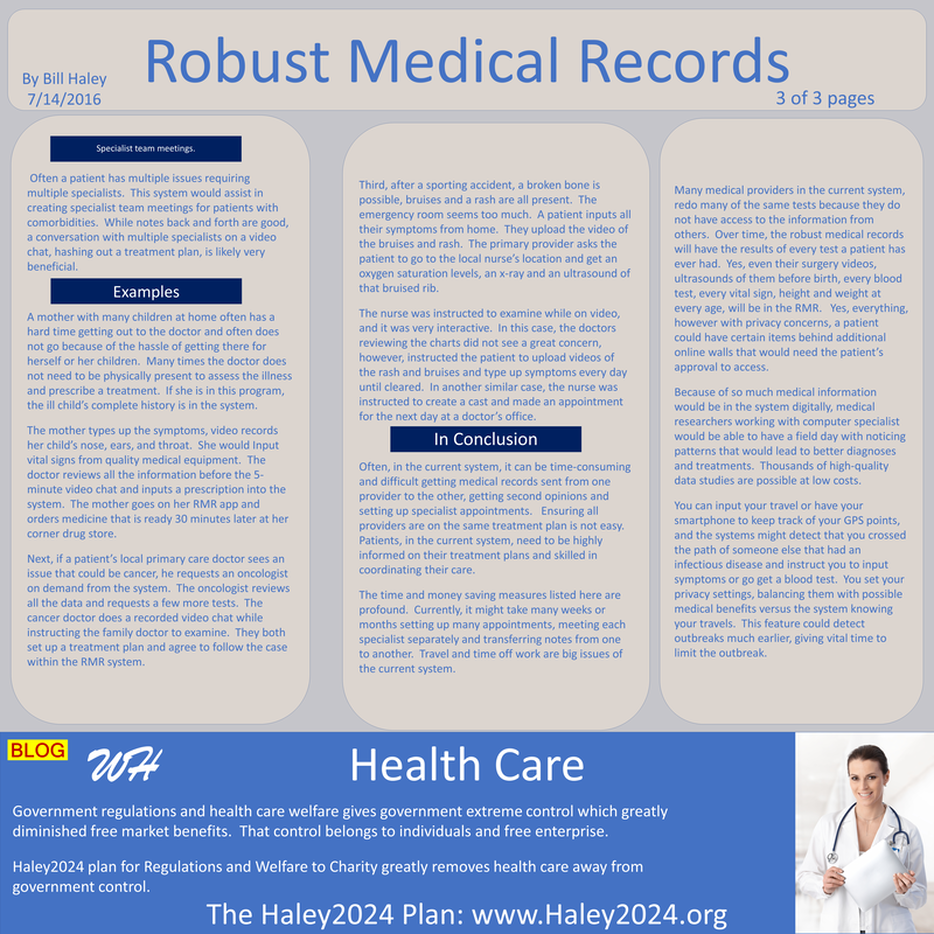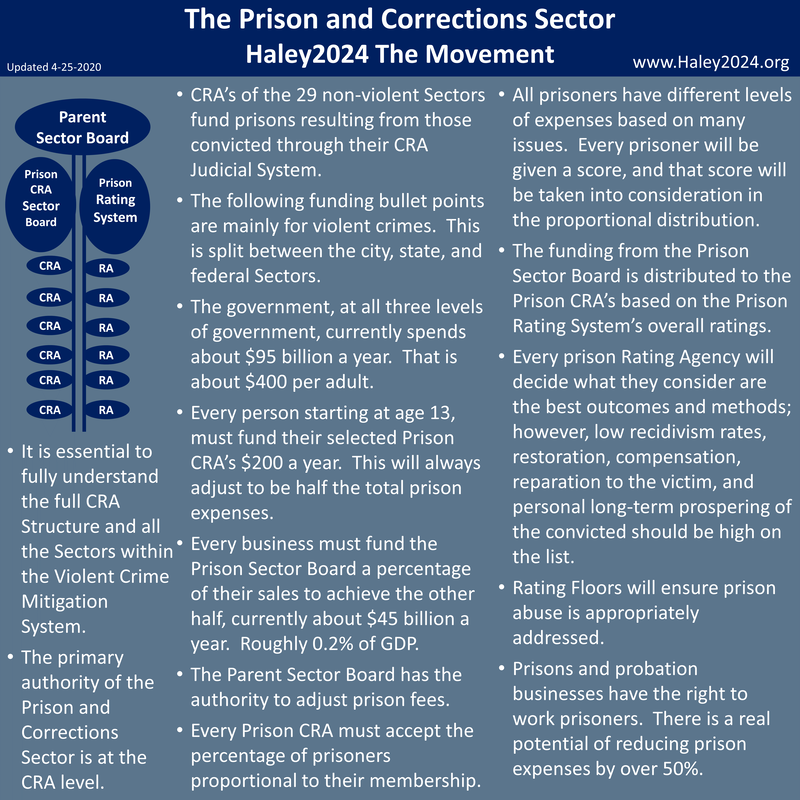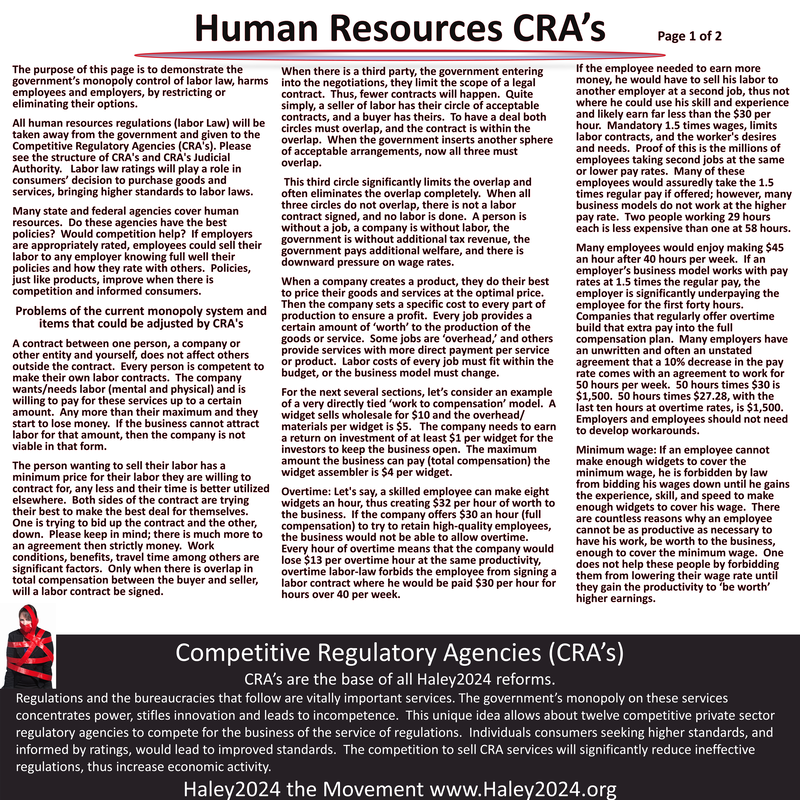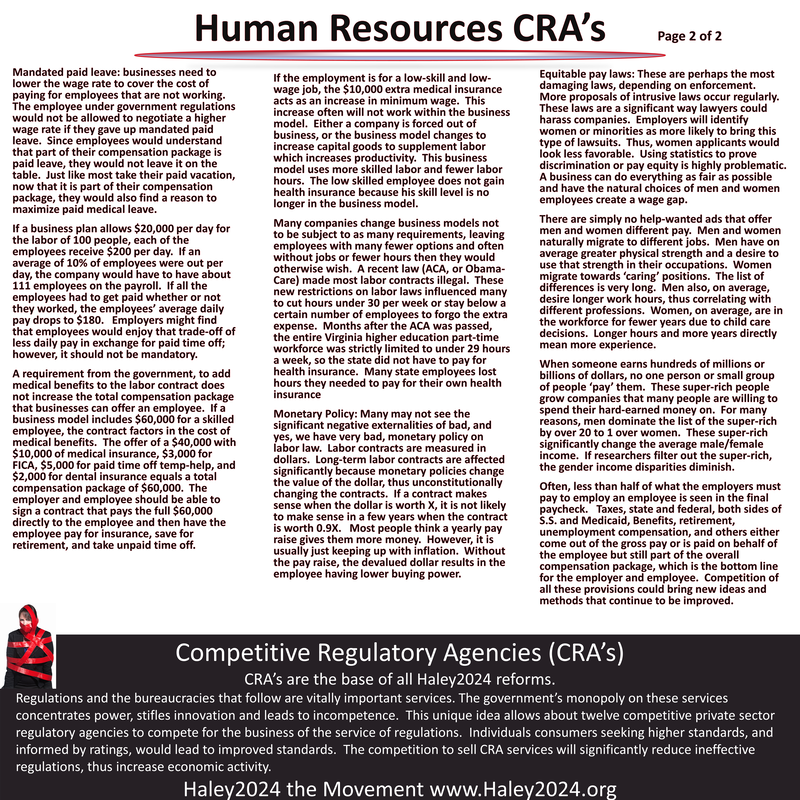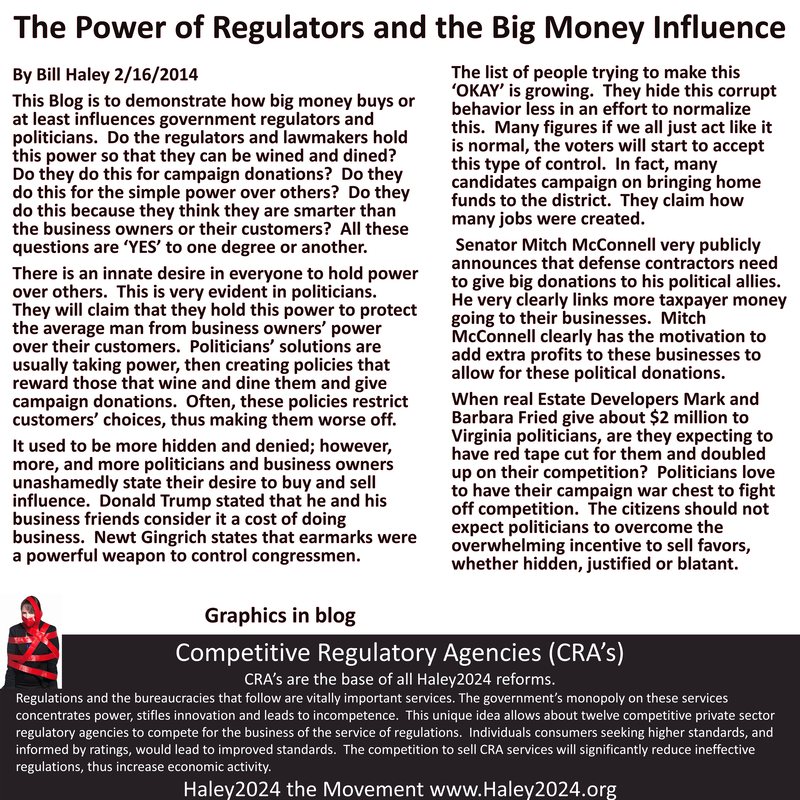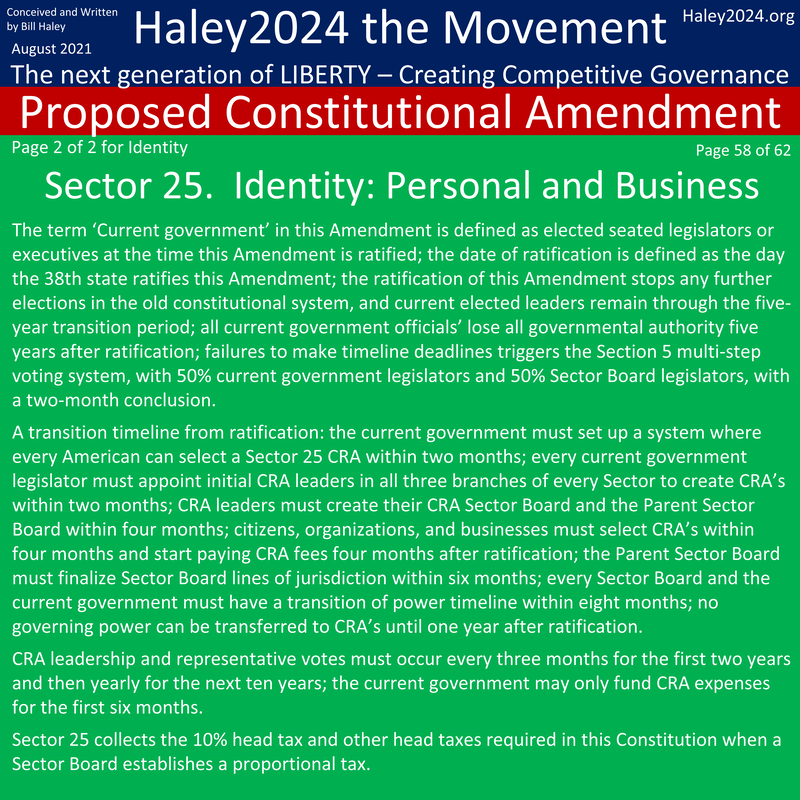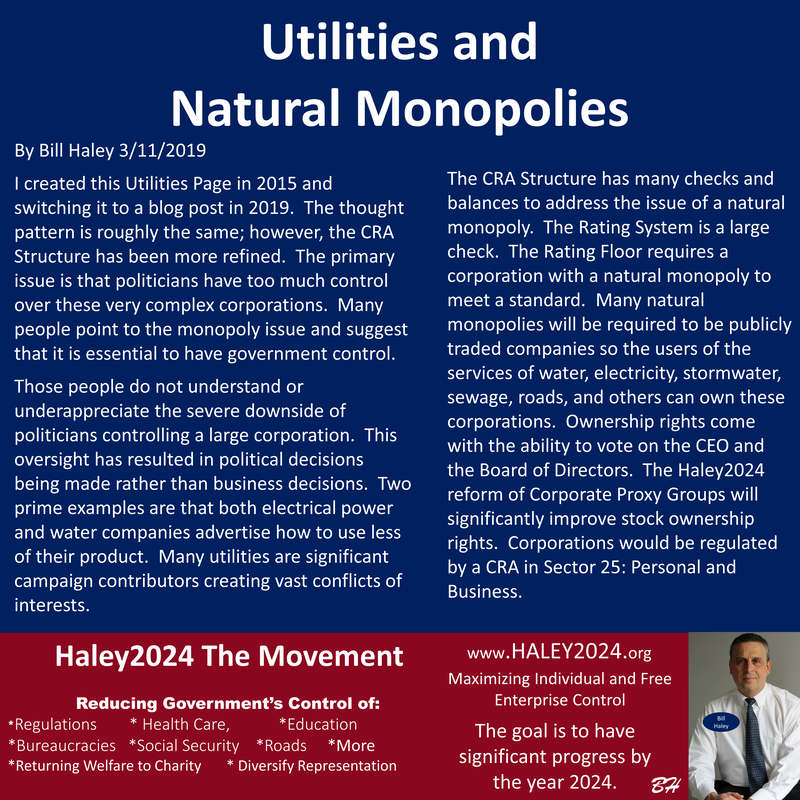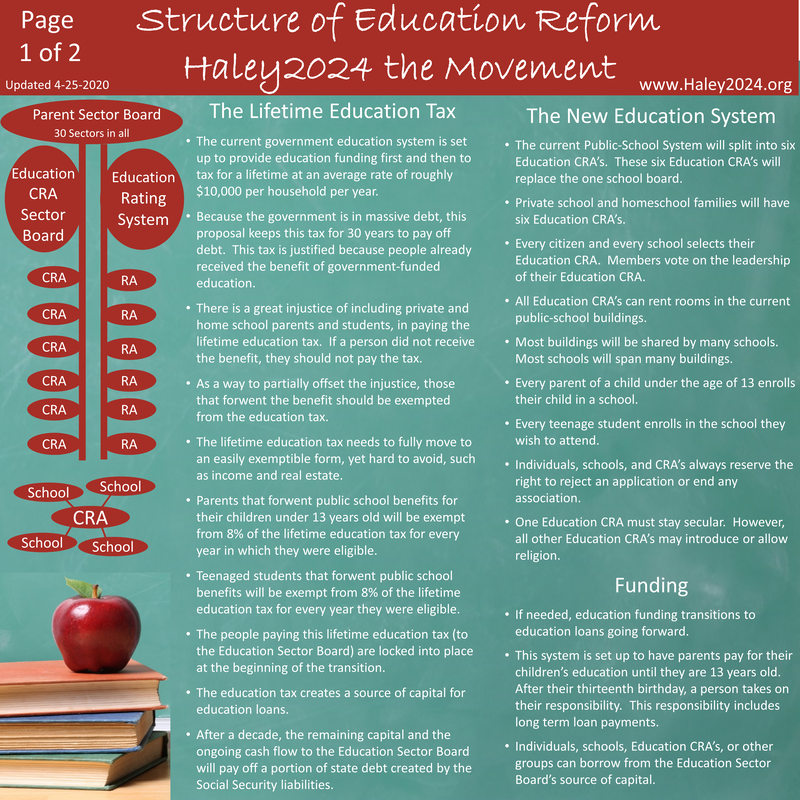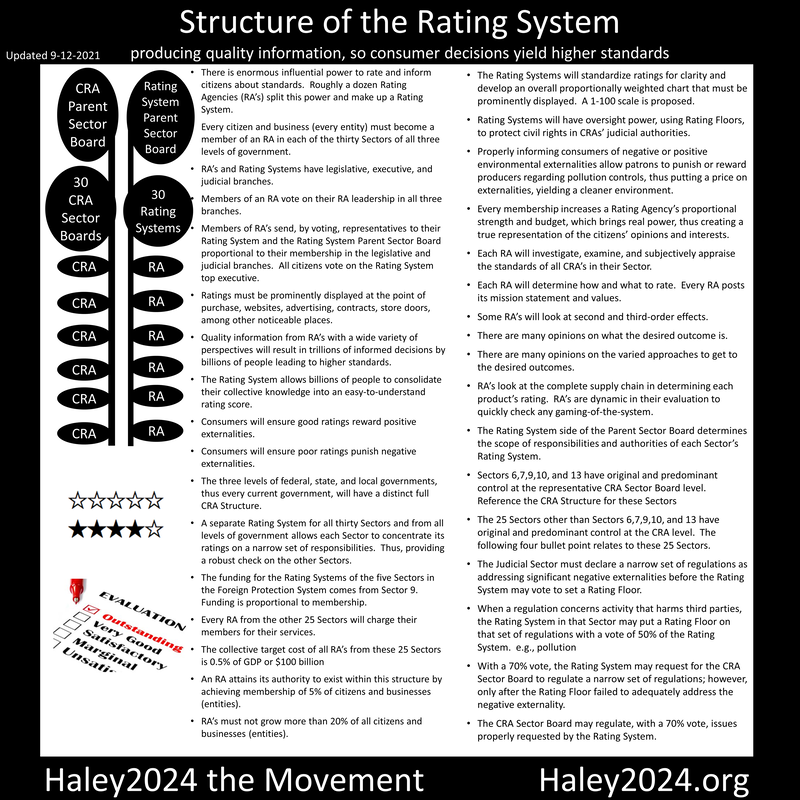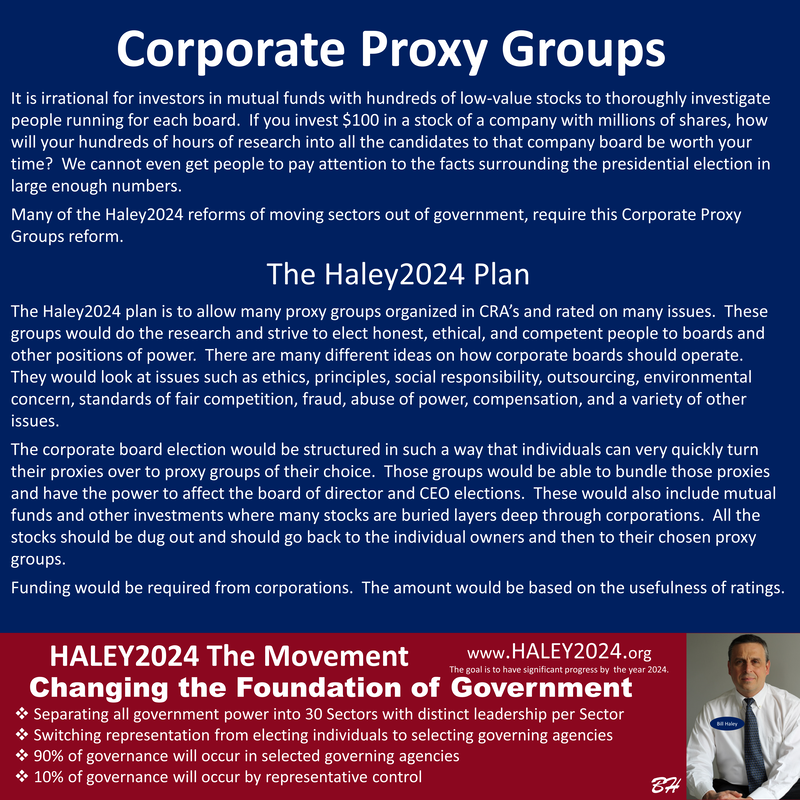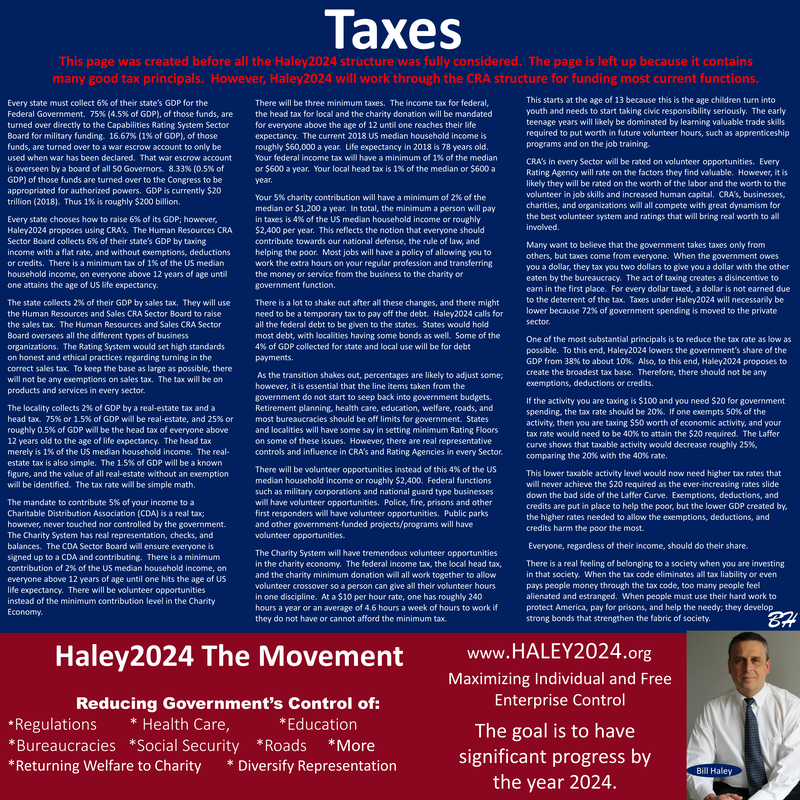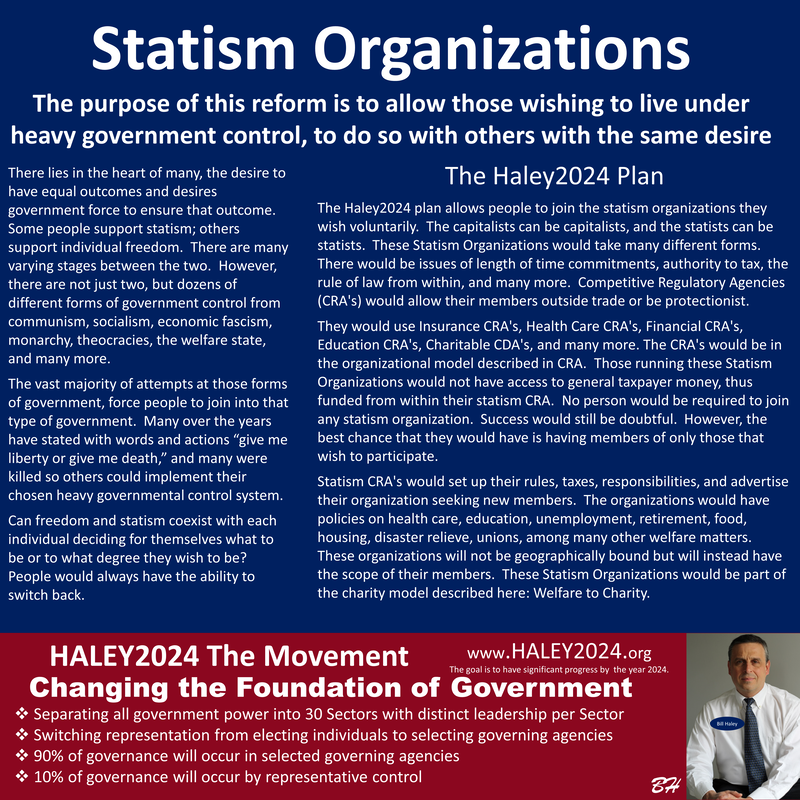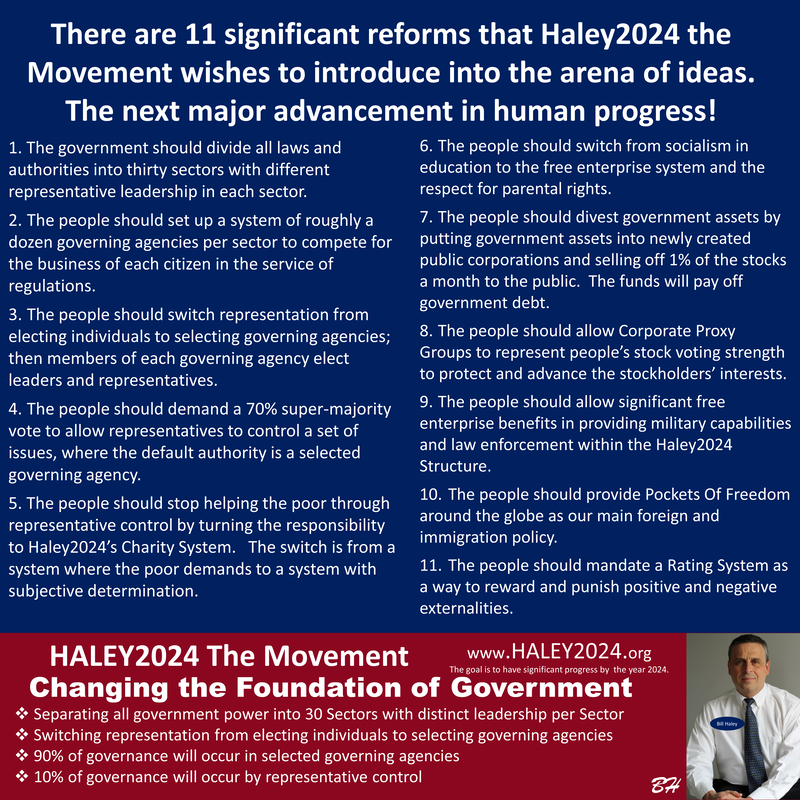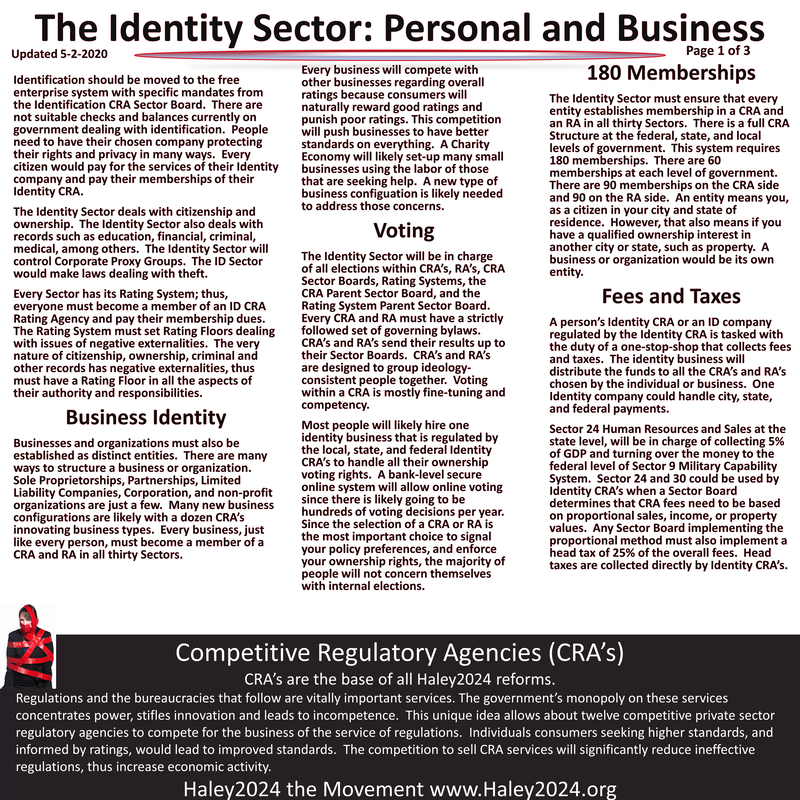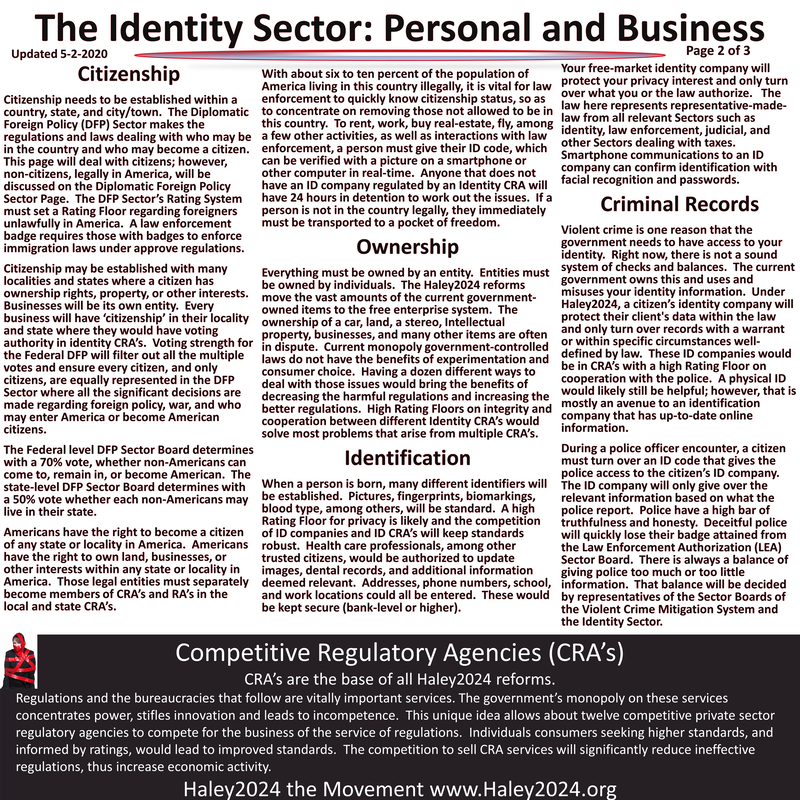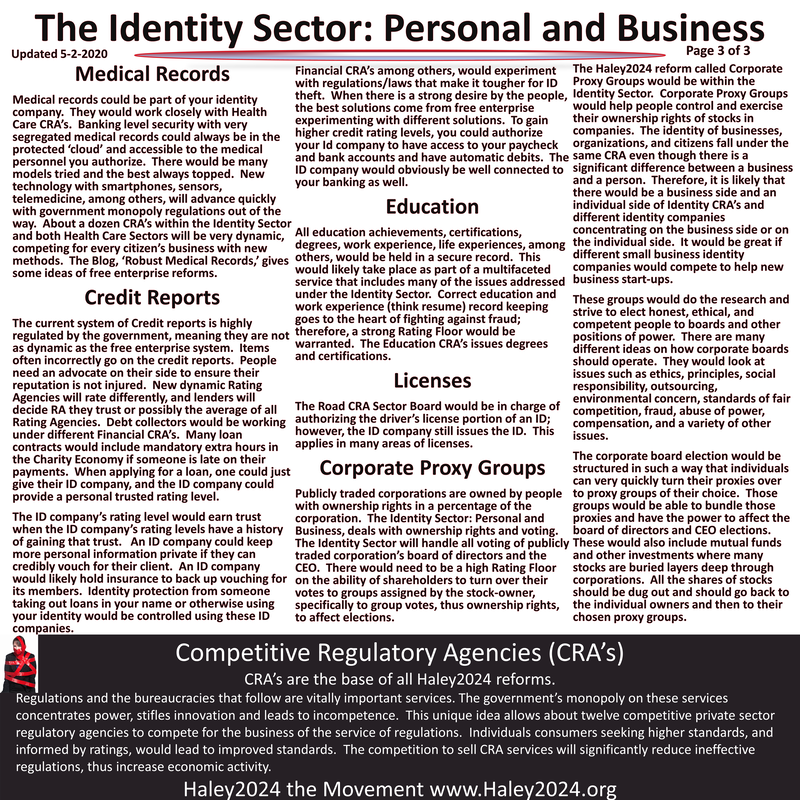The Identity Sector: Personal and Business
|
Identification should be moved to the free enterprise system with specific mandates from the Identification CRA Sector Board. There are not suitable checks and balances currently on government dealing with identification. People need to have their chosen company protecting their rights and privacy in many ways. Every citizen would pay for the services of their Identity company and pay their memberships of their Identity CRA.
The Identity Sector deals with citizenship and ownership. The Identity Sector also deals with records such as education, financial, criminal, medical, among others. The Identity Sector will control Corporate Proxy Groups. The ID Sector would make laws dealing with theft. |
|
Every Sector has its Rating System; thus, everyone must become a member of an ID CRA Rating Agency and pay their membership dues. The Rating System must set Rating Floors dealing with issues of negative externalities. The very nature of citizenship, ownership, criminal and other records has negative externalities, thus must have a Rating Floor in all the aspects of their authority and responsibilities.
|
Business Identity
|
Businesses and organizations must also be established as distinct entities. There are many ways to structure a business or organization. Sole Proprietorships, Partnerships, Limited Liability Companies, Corporation, and non-profit organizations are just a few. Many new business configurations are likely with a dozen CRA’s innovating business types. Every business, just like every person, must become a member of a CRA and RA in all thirty Sectors.
|
|
Every business will compete with other businesses regarding overall ratings because consumers will naturally reward good ratings and punish poor ratings. This competition will push businesses to have better standards on everything. A Charity Economy will likely set-up many small businesses using the labor of those that are seeking help. A new type of business configuation is likely needed to address those concerns.
|
VotingThe Identity Sector will be in charge of all elections within CRA’s, RA’s, CRA Sector Boards, Rating Systems, the CRA Parent Sector Board, and the Rating System Parent Sector Board. Every CRA and RA must have a strictly followed set of governing bylaws. CRA’s and RA’s send their results up to their Sector Boards. CRA’s and RA’s are designed to group ideology-consistent people together. Voting within a CRA is mostly fine-tuning and competency.
|
|
Most people will likely hire one identity business that is regulated by the local, state, and federal Identity CRA’s to handle all their ownership voting rights. A bank-level secure online system will allow online voting since there is likely going to be hundreds of voting decisions per year. Since the selection of a CRA or RA is the most important choice to signal your policy preferences, and enforce your ownership rights, the majority of people will not concern themselves with internal elections.
|
180 Memberships
The Identity Sector must ensure that every entity establishes membership in a CRA and an RA in all thirty Sectors. There is a full CRA Structure at the federal, state, and local levels of government. This system requires 180 memberships. There are 60 memberships at each level of government. There are 90 memberships on the CRA side and 90 on the RA side. An entity means you, as a citizen in your city and state of residence. However, that also means if you have a qualified ownership interest in another city or state, such as property. A business or organization would be its own entity.
|
Fees and Taxes
A person’s Identity CRA or an ID company regulated by the Identity CRA is tasked with the duty of a one-stop-shop that collects fees and taxes. The identity business will distribute the funds to all the CRA’s and RA’s chosen by the individual or business. One Identity company could handle city, state, and federal payments.
|
|
Sector 24 Human Resources and Sales at the state level, will be in charge of collecting 5% of GDP and turning over the money to the federal level of Sector 9 Military Capability System. Sector 24 and 30 could be used by Identity CRA’s when a Sector Board determines that CRA fees need to be based on proportional sales, income, or property values. Any Sector Board implementing the proportional method must also implement a head tax of 25% of the overall fees. Head taxes are collected directly by Identity CRA’s.
|
Citizenship
Citizenship needs to be established within a country, state, and city/town. The Diplomatic Foreign Policy (DFP) Sector makes the regulations and laws dealing with who may be in the country and who may become a citizen. This page will deal with citizens; however, non-citizens, legally in America, will be discussed on the Diplomatic Foreign Policy Sector Page. The DFP Sector’s Rating System must set a Rating Floor regarding foreigners unlawfully in America. A law enforcement badge requires those with badges to enforce immigration laws under approve regulations.
|
|
Citizenship may be established with many localities and states where a citizen has ownership rights, property, or other interests. Businesses will be its own entity. Every business will have ‘citizenship’ in their locality and state where they would have voting authority in identity CRA’s. Voting strength for the Federal DFP will filter out all the multiple votes and ensure every citizen, and only citizens, are equally represented in the DFP Sector where all the significant decisions are made regarding foreign policy, war, and who may enter America or become American citizens.
|
|
The Federal level DFP Sector Board determines with a 70% vote, whether non-Americans can come to, remain in, or become American. The state-level DFP Sector Board determines with a 50% vote whether each non-Americans may live in their state.
Americans have the right to become a citizen of any state or locality in America. Americans have the right to own land, businesses, or other interests within any state or locality in America. Those legal entities must separately become members of CRA’s and RA’s in the local and state CRA’s. |
|
With about six to ten percent of the population of America living in this country illegally, it is vital for law enforcement to quickly know citizenship status, so as to concentrate on removing those not allowed to be in this country. To rent, work, buy real-estate, fly, among a few other activities, as well as interactions with law enforcement, a person must give their ID code, which can be verified with a picture on a smartphone or other computer in real-time. Anyone that does not have an ID company regulated by an Identity CRA will have 24 hours in detention to work out the issues. If a person is not in the country legally, they immediately must be transported to a pocket of freedom.
|
Ownership
Everything must be owned by an entity. Entities must be owned by individuals. The Haley2024 reforms move the vast amounts of the current government-owned items to the free enterprise system. The ownership of a car, land, a stereo, Intellectual property, businesses, and many other items are often in dispute. Current monopoly government-controlled laws do not have the benefits of experimentation and consumer choice. Having a dozen different ways to deal with those issues would bring the benefits of decreasing the harmful regulations and increasing the better regulations. High Rating Floors on integrity and cooperation between different Identity CRA’s would solve most problems that arise from multiple CRA’s.
|
Identification
When a person is born, many different identifiers will be established. Pictures, fingerprints, biomarkings, blood type, among others, will be standard. A high Rating Floor for privacy is likely and the competition of ID companies and ID CRA’s will keep standards robust. Health care professionals, among other trusted citizens, would be authorized to update images, dental records, and additional information deemed relevant. Addresses, phone numbers, school, and work locations could all be entered. These would be kept secure (bank-level or higher).
|
|
Your free-market identity company will protect your privacy interest and only turn over what you or the law authorize. The law here represents representative-made- law from all relevant Sectors such as identity, law enforcement, judicial, and other Sectors dealing with taxes. Smartphone communications to an ID company can confirm identification with facial recognition and passwords.
|
Criminal Records
Violent crime is one reason that the government needs to have access to your identity. Right now, there is not a sound system of checks and balances. The current government owns this and uses and misuses your identity information. Under Haley2024, a citizen’s identity company will protect their client's data within the law and only turn over records with a warrant or within specific circumstances well-defined by law. These ID companies would be in CRA’s with a high Rating Floor on cooperation with the police. A physical ID would likely still be helpful; however, that is mostly an avenue to an identification company that has up-to-date online information.
|
|
During a police officer encounter, a citizen must turn over an ID code that gives the police access to the citizen’s ID company. The ID company will only give over the relevant information based on what the police report. Police have a high bar of truthfulness and honesty. Deceitful police will quickly lose their badge attained from the Law Enforcement Authorization (LEA) Sector Board. There is always a balance of giving police too much or too little information. That balance will be decided by representatives of the Sector Boards of the Violent Crime Mitigation System and the Identity Sector.
|
Medical Records
Medical records could be part of your identity company. They would work closely with Health Care CRA’s. Banking level security with very segregated medical records could always be in the protected ‘cloud’ and accessible to the medical personnel you authorize. There would be many models tried and the best always topped. New technology with smartphones, sensors, telemedicine, among others, will advance quickly with government monopoly regulations out of the way. About a dozen CRA’s within the Identity Sector and both Health Care Sectors will be very dynamic, competing for every citizen’s business with new methods. The Blog, ‘Robust Medical Records,’ gives some ideas of free enterprise reforms.
|
Credit Reports
The current system of Credit reports is highly regulated by the government, meaning they are not as dynamic as the free enterprise system. Items often incorrectly go on the credit reports. People need an advocate on their side to ensure their reputation is not injured. New dynamic Rating Agencies will rate differently, and lenders will decide RA they trust or possibly the average of all Rating Agencies. Debt collectors would be working under different Financial CRA’s. Many loan contracts would include mandatory extra hours in the Charity Economy if someone is late on their payments. When applying for a loan, one could just give their ID company, and the ID company could provide a personal trusted rating level.
|
|
The ID company’s rating level would earn trust when the ID company’s rating levels have a history of gaining that trust. An ID company could keep more personal information private if they can credibly vouch for their client. An ID company would likely hold insurance to back up vouching for its members. Identity protection from someone taking out loans in your name or otherwise using your identity would be controlled using these ID companies.
|
|
Financial CRA’s among others, would experiment with regulations/laws that make it tougher for ID theft. When there is a strong desire by the people, the best solutions come from free enterprise experimenting with different solutions.
|
|
Education
All education achievements, certifications, degrees, work experience, life experiences, among others, would be held in a secure record. This would likely take place as part of a multifaceted service that includes many of the issues addressed under the Identity Sector. Correct education and work experience (think resume) record keeping goes to the heart of fighting against fraud; therefore, a strong Rating Floor would be warranted. The Education CRA’s issues degrees and certifications.
|
Licenses
Corporate Proxy Groups
Publicly traded corporations are owned by people with ownership rights in a percentage of the corporation. The Identity Sector: Personal and Business, deals with ownership rights and voting. The Identity Sector will handle all voting of publicly traded corporation’s board of directors and the CEO. There would need to be a high Rating Floor on the ability of shareholders to turn over their votes to groups assigned by the stock-owner, specifically to group votes, thus ownership rights, to affect elections.
|
|
The Haley2024 reform called Corporate Proxy Groups would be within the Identity Sector. Corporate Proxy Groups would help people control and exercise their ownership rights of stocks in companies. The identity of businesses, organizations, and citizens fall under the same CRA even though there is a significant difference between a business and a person. Therefore, it is likely that there would be a business side and an individual side of Identity CRA’s and different identity companies concentrating on the business side or on the individual side. It would be great if different small business identity companies would compete to help new business start-ups.
|
|
These groups would do the research and strive to elect honest, ethical, and competent people to boards and other positions of power. There are many different ideas on how corporate boards should operate. They would look at issues such as ethics, principles, social responsibility, outsourcing, environmental concern, standards of fair competition, fraud, abuse of power, compensation, and a variety of other issues.
|
|
The corporate board election would be structured in such a way that individuals can very quickly turn their proxies over to proxy groups of their choice. Those groups would be able to bundle those proxies and have the power to affect the board of directors and CEO elections. These would also include mutual funds and other investments where many stocks are buried layers deep through corporations. All the shares of stocks should be dug out and should go back to the individual owners and then to their chosen proxy groups.
|


